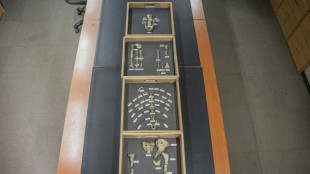-
 England thrash Japan 59-14 to snap five-match losing streak
England thrash Japan 59-14 to snap five-match losing streak
-
S.Africa's Breyten Breytenbach, writer and anti-apartheid activist

-
 Concern as climate talks stalls on fossil fuels pledge
Concern as climate talks stalls on fossil fuels pledge
-
Breyten Breytenbach, writer who challenged apartheid, dies at 85

-
 Truce called after 82 killed in Pakistan sectarian clashes
Truce called after 82 killed in Pakistan sectarian clashes
-
Salah wants Liverpool to pile on misery for Man City after sinking Saints

-
 Berrettini takes Italy to brink of Davis Cup defence
Berrettini takes Italy to brink of Davis Cup defence
-
Lille condemn Sampaoli to defeat on Rennes debut

-
 Leicester sack manager Steve Cooper
Leicester sack manager Steve Cooper
-
Salah sends Liverpool eight points clear after Southampton scare

-
 Key Trump pick calls for end to escalation in Ukraine
Key Trump pick calls for end to escalation in Ukraine
-
Tuipulotu try helps Scotland end Australia's bid for a Grand Slam

-
 Davis Cup organisers hit back at critics of Nadal retirement ceremony
Davis Cup organisers hit back at critics of Nadal retirement ceremony
-
Noel in a 'league of his own' as he wins Gurgl slalom

-
 A dip or deeper decline? Guardiola seeks response to Man City slump
A dip or deeper decline? Guardiola seeks response to Man City slump
-
Germany goes nuts for viral pistachio chocolate

-
 EU urges immediate halt to Israel-Hezbollah war
EU urges immediate halt to Israel-Hezbollah war
-
Basel votes to stump up bucks to host Eurovision

-
 Ukraine shows fragments of new Russian missile after 'Oreshnik' strike
Ukraine shows fragments of new Russian missile after 'Oreshnik' strike
-
Six face trial in Paris for blackmailing Paul Pogba

-
 Olympic champion An wins China crown in style
Olympic champion An wins China crown in style
-
It's party time for Las Vegas victor Russell on 'dream weekend'

-
 Norris applauds 'deserved' champion Verstappen
Norris applauds 'deserved' champion Verstappen
-
Kohli blasts century as India declare against Australia

-
 Verstappen 'never thought' he'd win four world titles
Verstappen 'never thought' he'd win four world titles
-
Former Masters champion Reed wins Hong Kong Open

-
 Awesome foursomes: Formula One's exclusive club of four-time world champions
Awesome foursomes: Formula One's exclusive club of four-time world champions
-
Smylie beats 'idol' Cameron Smith to win Australian PGA Championship

-
 Five key races in Max Verstappen's 2024 title season
Five key races in Max Verstappen's 2024 title season
-
Max Verstappen: Young, gifted and single-minded four-time F1 champion

-
 'Star is born': From homeless to Test hero for India's Jaiswal
'Star is born': From homeless to Test hero for India's Jaiswal
-
Verstappen wins fourth consecutive Formula One world title

-
 Survivors, sniffing dogs join anti-mine march at Cambodia's Angkor Wat
Survivors, sniffing dogs join anti-mine march at Cambodia's Angkor Wat
-
Far right eye breakthrough in Romania presidential vote

-
 Jaiswal slams majestic 161 but Australia fight back in Perth
Jaiswal slams majestic 161 but Australia fight back in Perth
-
Edinburgh's alternative tour guides show 'more real' side of city

-
 IPL teams set to splash the cash at 'mega-auction' in Saudi Arabia
IPL teams set to splash the cash at 'mega-auction' in Saudi Arabia
-
Olympics in India a 'dream' facing many hurdles

-
 Wounded Bangladesh protesters receive robotic helping hand
Wounded Bangladesh protesters receive robotic helping hand
-
Majestic Jaiswal 141 not out as India pile pain on Australia

-
 Giannis, Lillard lead Bucks over Hornets as Spurs beat Warriors
Giannis, Lillard lead Bucks over Hornets as Spurs beat Warriors
-
Juan Mata agent slammed as 'cowardly' by angry A-League coach

-
 Marta inspires Orlando Pride to NWSL title
Marta inspires Orlando Pride to NWSL title
-
Palestinian pottery sees revival in war-ravaged Gaza

-
 Main points of the $300 billion climate deal
Main points of the $300 billion climate deal
-
Robertson wants policy change for overseas-based All Blacks

-
 Israel retreat helps rescuers heal from October 7 attack
Israel retreat helps rescuers heal from October 7 attack
-
Afghan women turn to entrepreneurship under Taliban

-
 Mounting economic costs of India's killer smog
Mounting economic costs of India's killer smog
-
At climate talks, painstaking diplomacy and then anger

EU backs plan to downgrade wolf protection status
EU member states on Wednesday voted in favour of lowering the protection status of wolves, a move decried by conservationists that paves the way for a relaxation of tight hunting restrictions.
Grey wolves were virtually exterminated in Europe a century ago, but their numbers have rebounded thanks to conservation efforts, triggering howls of protest from farmers angered at livestock losses.
Representatives for the bloc's 27 countries backed a proposal to push for changes to an international wildlife convention that would see the species downgraded from "strictly protected" to "protected".
The European Commission, which initially put forward the plan, welcomed its approval by a wide majority of member states during a meeting in Brussels. Only two voted against, according to a diplomatic source.
"Adapting the protection status will be an important step to address the challenges posed by increasing wolf population while keeping the overall objective to achieve and maintain a favourable conservation status for the species," commission spokesman Adalbert Jahnz told reporters.
In 2023, there were breeding packs of grey wolves in 23 European Union countries, with a total population estimated at around 20,300 animals, bringing the elusive creatures into more frequent contact with humans.
In announcing plans to revise the species' status last year, Commission chief Ursula von der Leyen said the "concentration of wolf packs in some European regions has become a real danger especially for livestock".
In late 2022, von der Leyen herself lost her beloved pony Dolly to a wolf that crept into its enclosure on her family's rural property in northern Germany -- leading some to suggest the matter had become personal.
- 'Politically motivated' -
The wolf became a "strictly protected" species under the 1979 Bern Convention, to which the EU is a party.
The text allows for the animal to be killed or captured only when it poses a threat to livestock, health or safety.
The commission's proposal would loosen such rules by demoting wolves to "protected" species, which would allow hunting to resume under strict regulation.
But animal rights activists fear that by sending the wrong message the change could result in large numbers of wolves being shot dead.
Already in 2022, several Austrian regions authorised the killing of wolves in what environmental groups argued was a breach of current European laws.
More than 300 environmental and animal protection organisations opposed a status downgrade, arguing it was premature since while population numbers have grown, their recovery is still ongoing.
In a letter, they said there was no evidence that culling reduced depredation on farmed animals. Hunting was no replacement for other prevention measures, such as fencing, they argued.
"We see this as a proposal that is politically motivated and not at all based on science," Sabien Leemans, senior policy officer at environmental group WWF, told AFP.
- Small impact -
This year has seen rolling protests by farmers in Brussels and around Europe against the bloc's environmental rules.
A 2023 EU report found that the overall impact of wolves on livestock was "very small". Only 0.065 percent of the bloc's 60 million sheep were mauled to death every year and just over 18 million euros ($20 million) was paid to compensate for wolf damages annually.
Deaths could however be concentrated in certain areas, the report said, adding that horses, dogs and other animals were also sometimes slain -- but no fatal wolf attacks on people have been recorded in Europe over the past 40 years.
Wednesday's vote, once formally adopted by the bloc's environment ministers, will give the EU a mandate to push for a change in the Bern Convention at its next standing committee meeting scheduled for December.
A two-thirds majority is required to alter the text, which was signed by 50 countries, including the 27 EU members.
If the convention is changed, the commission will then be allowed to move to amend related EU rules.
"Today's decision... empowers rural communities to take the necessary steps to protect themselves," said Herbert Dorfmann, a lawmaker with the conservative European People's Party (EPP), the largest group in the European Parliament.
But Leemans of the WWF warned it risked opening a "Pandora's box". Some countries are already pushing to ease hunting rules for brown bears too, he argued -- a concern dismissed by the commission.
"What we're talking about is the wolf, and only the wolf," said Jahnz.
T.Vitorino--PC



